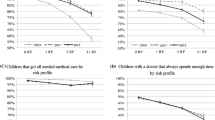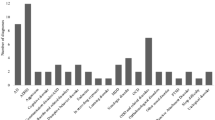Abstract
The purpose of this study was to examine the impact of a care coordination intervention aimed at improving the medical home for children with special health care needs (CSHCN). 100 CSHCN referred by a Medicaid managed care plan were randomly assigned to a care coordination intervention or to a wait list comparison group that received standard care. For the intervention group, a care coordinator supported the medical home by consulting with primary care providers at multiple practices to develop an integrated, individualized plan to meet child and family needs. During the second phase of the study, the wait list comparison group received the 6-month intervention. At the end of 12 months, the two groups were combined to examine within subject differences (n = 61). Compared to the control group, participants in the initial intervention group reported a decreased need for information and improved satisfaction with mental health services and specialized therapies. This effect was replicated when the wait list control group received the intervention. Additional benefits were observed in the within subject analysis, including a decline in unmet needs, improved satisfaction with specialty care and care coordination, and improved ratings of child health and family functioning. This intervention improved outcomes for CSHCN and their families by supporting the efforts of primary care physicians to provide comprehensive and coordinated care through the medical home. The consulting care coordinator may provide an efficient and cost effective approach to enhancing the quality of care for CSHCN.

Similar content being viewed by others
Abbreviations
- CSHCN:
-
Children with special health care needs
- ICD-9-CM:
-
International Classification of Disease, 9th Revision, Clinical Modification
- FSS:
-
Family Support Specialist
- FNS:
-
Family Needs Survey
- IFS:
-
Impact on Family Scale
- FS II [R]:
-
Functional Status II (Revised)
- FS:
-
Family Support scale
- SD:
-
Standard deviation
References
US Department of Health and Human Services. (2000). Healthy people 2010: Understanding and improving health (2nd ed.). Washington, D.C: U.S. Government Printing Office.
Antonelli, R. C., McAllister, J. W., & Popp, J. (2009). Making care coordination a critical component of the pediatric health system: A multidisciplinary framework. [updated 2009; cited 2009 December 12], 1–26 Available from: commonwealthfund.org.
Perrin, J. M., Romm, D., Bloom, S. R., Homer, C. J., Kuhlthau, K. A., Cooley, C., et al. (2007). A family-centered, community-based system of services for children and youth with special health care needs. Archives of Pediatr Adolescence, 161(10), 933–936.
McAllister, J. W., Presler, E., & Cooley, W. C. (2007). Practice-based care coordination: A medical home essential. Pediatrics, 120(3), e723–e733.
Kogan, M. D., Strickland, B. B., & Newacheck, P. W. (2009). Building systems of care: Findings from the national survey of children with special health care needs. Pediatrics 2009 Supplement December, 124, S333–S336.
Warfield, M. E., & Gulley, S. (2006). Unmet need and problems accessing specialty medical and related services among children with special health care needs. Maternal and Child Health Journal, 10(2), 201–216.
Strickland, B., McPherson, M., Weissman, G., van Dyke, P., Huang, Z. J., & Newacheck, P. W. (2004). Access to the medical home: Results of the national survey of children with special health care needs. Pediatrics, 113(5), 1485–1492.
Gupta, V. B., O’Connor, K. G., & Quezada-Gomez, C. (2004). Care coordination services in pediatric practices. Pediatrics, 113(5), 1517–1521.
Homer, C. J., Klatka, K., Tomm, D., Kuhlthau, K., Bloom, S. R., Newacheck, P. W., et al. (2008). A review of the evidence for the medical home for children with special health care needs. Pediatrics, 122(4, October), e922–e937.
Antonelli, R. C., Stille, C. J., & Antonelli, D. M. (2008). Care coordination for children and youth with special health care needs: A descriptive, multisite study of activities, personnel costs, and outcomes. Pediatrics, 122(1), e209–e216.
Wood, D. L., Winterbauer, N., Sloyer, P., Jobli, E., Hou, T., McCaskill, Q. E., et al. (2009). A longitudinal study of a pediatric practice-based versus an agency based model of care coordination for child and youth with special health care needs. Maternal and Child Health Journal, 13(5), 667–676.
Farmer, J. E., Clark, M. J., Sherman, A., Marien, W. E., & Selva, T. J. (2005). Comprehensive primary care for children with special health care needs in rural areas. Pediatrics, 116, 649–656.
Bethell, C. D., Read, D., Stein, R. E. K., Blumberg, S. J., Wells, N., & Newacheck, P. W. (2002). Identifying children with special health care needs: development and evaluation of a short screening instrument. Ambulatory Pediatrics, 2, 49–57.
Palfrey, J. S., Sofis, L. A., Davidson, E. J., Liu, J., Freeman, L., & Ganz, M. L. (2004). The Pediatric alliance for coordinated care: Evaluation of a medical home model. Pediatrics, 113, 1507–1516.
Drotar, D. (2001). Promoting comprehensive care for children with chronic health conditions and their families: Introduction to the special issue. Children’s Services: Social Policy, Research, and Practice, 4, 157–163.
Jessop, D. J., & Stein, R. E. K. (1994). Providing comprehensive health care to children with chronic illness. Pediatrics, 93(4), 602–607.
King, G., King, S., Rosenbaum, P., & Goffin, R. (1999). Family-centered caregiving and well-being of parents of children with disabilities: Linking process with outcome. Journal of Pediatric Psychology, 24, 41–53.
Ganz, M. L., & Tendulkar, S. A. (2006). Mental health care services for children with special health care needs and their family members: Prevalence and correlates of unmet needs. Pediatrics, 117(6), 2138–2148.
Kazak, A. E., Rourke, M. T., & Navsaria, N. (2009). Families and other systems in pediatric psychology. In M. C. Roberts, & R. Steele (Eds.), Handbook of pediatric psychology (4th ed., pp. 571–656). New York: Guilford Press.
Epstein, S. G., Taylor, A. B., Halberg, A. S., Gardner, J. D., Walker, D. K., & Crocker, A. C. (1998). Shared responsibilities: Ensuring quality managed care for children with special health care needs. Took kit: Version 1.0. Boston, MA: New England SERVE.
Dunst, C. J., Trivette, C. M., & Hamby, D. W. (1994). Measuring social support in families with young children with disabilities. In C. J. Dunst, C. M. Trivette, & A. J. Deal (Eds.), Supporting and strengthening families: Methods, strategies, and practices. Cambridge, MA: Brookline Books.
Bailey, D. B., & Simeonsson, R. J. (1988). Assessing needs of families with handicapped infants. Journal of Special Education, 22, 117–126.
Stein, R. E. K., & Riessman, C. K. (1980). The development of an Impact-on-Family Scale: Preliminary findings. Medical Care, 18, 465–472.
Beck, A. T., Steer, R. A., & Brown, G. K. (1996). Manual for the beck depression inventory (2nd ed.). Antonio, TX: The Psychological Corporation.
Stein, R. E. K., & Jessop, D. J. (1990). Functional Status II (R): A measure of child health status. Medical Care, 28, 1041–1055.
Pediatric Alliance for Coordinated Care Project. (1998). The pediatric alliance for coordinated care family survey—Your care experience. Boston, MA: Children’s Hospital Corporation.
Medicode. (2000). 2001 physician international classification of diseases, ninth revision, clinical modification (6th ed.). Salt Lake City: Medicode.
Acknowledgments
This research was supported by a grant from the Missouri Foundation for Health (Grant # 02-0020-03) and Missouri Care Health Plan. We also extend our thanks to the primary care practices and families who so generously gave of their time to make this research possible.
Author information
Authors and Affiliations
Corresponding author
Rights and permissions
About this article
Cite this article
Farmer, J.E., Clark, M.J., Drewel, E.H. et al. Consultative Care Coordination Through the Medical Home for CSHCN: A Randomized Controlled Trial. Matern Child Health J 15, 1110–1118 (2011). https://doi.org/10.1007/s10995-010-0658-8
Published:
Issue Date:
DOI: https://doi.org/10.1007/s10995-010-0658-8




